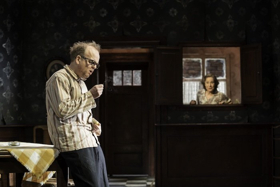Review: THE BIRTHDAY PARTY, Harold Pinter Theatre
|
![]() It's 60 years since Harold Pinter's play premiered - and flopped - at Lyric Hammersmith, baffling critics (with one exception) and audiences alike. Now, we expect the sinister subversion of both the seemingly mundane setting and the dramatic form that Pinter the jobbing actor knew from rep: that of the sub-Christie mystery thriller. But played well, as it is here by a starry cast, the play still has the power to unsettle.
It's 60 years since Harold Pinter's play premiered - and flopped - at Lyric Hammersmith, baffling critics (with one exception) and audiences alike. Now, we expect the sinister subversion of both the seemingly mundane setting and the dramatic form that Pinter the jobbing actor knew from rep: that of the sub-Christie mystery thriller. But played well, as it is here by a starry cast, the play still has the power to unsettle.
 Petey and Meg run a dismal boarding house by the sea. Their sole guest is the equally rundown Stanley, who spins tales about his past as a concert pianist. But their comfortable, if unusual, living arrangement is interrupted by the arrival of two men, Goldberg and McCann, who offer to throw Stanley a birthday party, but in fact have a very different claim on him.
Petey and Meg run a dismal boarding house by the sea. Their sole guest is the equally rundown Stanley, who spins tales about his past as a concert pianist. But their comfortable, if unusual, living arrangement is interrupted by the arrival of two men, Goldberg and McCann, who offer to throw Stanley a birthday party, but in fact have a very different claim on him.
The Quay Brothers' design vividly evokes time and place: the wallpaper puckering with damp, the heavy furniture with a thick film of dust, the lace curtains and fussy ornaments. The costumes are just as articulate, Stanley's rumpled shirt and sweater vest sharply contrasted with the arriving duo's sleek dark suits, while party guest Lulu - who tries to coax Stanley outside - sports the most fabulous plant-patterned trousers.
Ian Rickson's revival is beautifully measured, allowing the absurdities, contradictions and creeping dread to arise naturally. We begin with domestic comedy, as Zoë Wanamaker's Meg pops her head through the kitchen hatch (in another world, to the cheers of a studio audience) to pepper her husband with timeworn, mundane questions - their circular conversation exasperated yet affectionate.
Peter Wight and Wanamaker superbly convey these ingrained marital patterns, in a lighter version of the play's later double-act interrogation. The meta gag about a local show that disappoints the musicals-loving Meg ("They just talk?") is wryly underplayed, and questions subtly raised: is this really a boarding house, why do the couple not have children, and how did their eternal lodger Stanley come to fill that role?
Wanamaker hints at Meg's forgetfulness and distraction being symptomatic of something more serious, and Wight's Petey is touchingly careful with her. It adds a frisson to the semi-flirtation between Meg and Stanley - played by standout Toby Jones as an arresting combination of demanding infant, wild eccentric and hollowed-out victim - as neither seem to have a full grasp of their present situation, slipping into a muddled past.
The elusiveness of memory looms large, as stories are recounted and altered (Meg mangles her retelling of Stanley's supposed former life), and Goldberg dreams of a lost golden youth - nostalgia with an underlying threat. Most crucial is the past that brings the duo to Stanley's door: one that they're grimly sure of, and that he denies.
Stephen Mangan could initially pass for the one of the genial policeman populating the genre Pinter riffs off, until his garrulousness turns bullying and his height suddenly seems horribly imposing. He and Tom Vaughan-Lawlor - as a paranoid, furiously tense McCann - excel at the rat-a-tat interrogation, wearing down Jones's bullish Stanley by sheer force of words.
Mangan also impresses with some decidedly creepy physicality - extending his tongue like a snake, yawning his mouth open and demanding McCann peer into it - but lets the intensity drop towards the end. He doesn't fully surrender to this netherworld, and so we don't feel as endangered as we should.
Vaughan-Lawlor, in contrast, is utterly committed - he tears strips from a newspaper like a man possessed - as is Pearl Mackie in the thankless role of Lulu, who's only introduced to be the victim of Goldberg's sexual menace. Mackie nevertheless brings a chipper charisma to the role, and later a powerful sense of trauma.
The writing of Lulu is a notable weakness of this early work - along with the rather cheap theatrical ploy of a blackout - but it's otherwise astonishing how defined Pinter's voice is already: the musicality of place names, the unexplained significance of outside players ("The List", "The Organisation"), the way that a simple action like sitting down can be loaded with meaning, the gradual removal of all certainties.
Rickson's production is on the conservative side, but its care illuminates the detail of Pinter's work. Troubling moments lodge in the brain - Jones's Stanley banging on a toy drum with a manic glee that hints at brutality; McCann callously snapping Stanley's glasses; Wight's Petey calling out hopelessly to a catatonic Stanley, both victims of an unforgiving system.
Though Pinter famously refused to provide answers, it now strikes a national mood of shifting uncertainty and hostility, with plans built upon a past that looks different through each person's eyes. Beyond that, it's a terrifically entertaining and oddly moving piece of theatre.
The Birthday Party at Harold Pinter Theatre until 14 April
Read our interview with Peter Wight
Photo credit: Johan Persson
Comments
Videos

